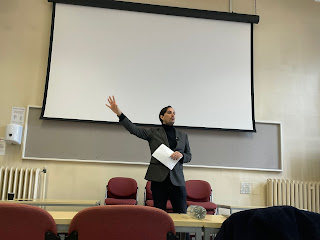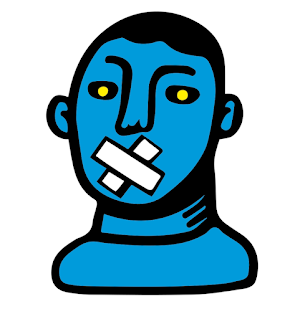This is a brief report of some of the talks delivered on the second day of the Philosophy of Medicine Roundtable hosted by King's College London in June 2025. For a report of day one, please go here.
 |
| From the poster of the Roundtable |
The second day of the event started with a presentation by Devora Shapiro on the role of EBM (evidence-based medicine) in enabling phenomena such as medical gaslighting and illness invalidation. Shapiro discussed cases where patients are told that there are no medical issues for them, because the test results come back with no indication of pathology, and yet the patient has a complaint that matters to them and is not given sufficient uptake.
 |
| A slide of Shapiro's presentation |
The discussion following the presentation centred on what causes the problems of power-imbalanced relationships between doctors and patients, whether it is EBM or something else, for instance a failure to provide care or a lack of recognition that, although successful, medicine cannot tackle all human problems.
In one of the several talks by project EPIC members at the Roundtable, Elisabetta Lalumera asked why definitions matter in medicine and how linguistic labels function as operational tools. Conceptual engineering and conceptual choice may serve various goals such as diagnostic utility and inclusivity. One example of the importance of definitions is the change in the definition of pain, which has been revised in 2020 to include the sensations of those who cannot describe pain such as infants, nonverbal patients and animals.
 |
| Elisabetta Lalumera on definitions of pain |
Such revision was motivated by inclusivity and ethical concerns so it was a deliberate value-laden choice. The new definition has the merit of avoiding the risk of epistemic injustice (e.g. when a patient claims to be in pain but no lesion is found) but has risks as well, being more vague, more difficult to operationalise, and likely leading to overmedicalisation of human experience.
In the next talk, Kathleen Murphy-Hollies, postdoc on project EPIC, presented a talk about what it means to give uptake to the metaphorical meaning of delusions. Murphy-Hollies started talking about the experience of entomologists being contacted by people with delusions of parasitosis claiming that they are suffering from an infestation. How should entomologists deal with these cases? To what extent should they believe the people claiming an infestation?
Each testimony has two aspects: the propositional content conveyed and the perspective conveyed in the statement. We can fail to believe what the person says and yet take their perspective seriously. Maybe delusions express metaphorical meaning that is worth trying to understand. Murphy-Hollies builds on account by Federico Bongiorno and Rosa Ritunnano to explore the metaphorical interpretation of delusional utterances.
 |
| Kathleen Murphy-Hollies on delusions |
In the rest of the talk, Murphy-Hollies observed how metaphorical meaning is not just relevant to people reporting delusional beliefs, but is often conveyed in cases of reports by people who experienced trauma or have implicit knowledge. This observations lead to a new understanding of uptake which is not just believing what the person is saying but is about mutual engagement.
Dan Degerman talked about the medicalisation of silence. Silence has been seen as a cause of depression (not talking about something might lead someone to become depressed), as a symptom of depression (it appears in the criteria for depression), as a problem in the workplace (underperforming) and as a cause and symptom of depression in that context.
 |
| Dan Degerman on silence |
Degerman asks why the medicalisation of silence is a worry. Silence is a diagnostic marker for depression and can be associated with distress. But by medicalising silence we represent it as a threat, we end up avoiding it, and we obscure its benefits:
- social benefits
- epistemic benefits
- medical benefits.
.png)
.png)
.png)




























